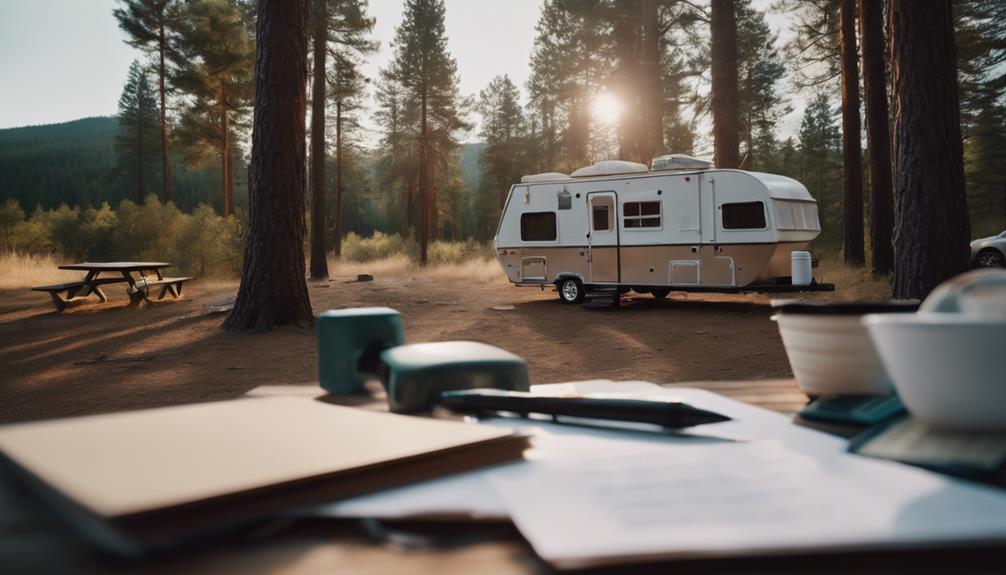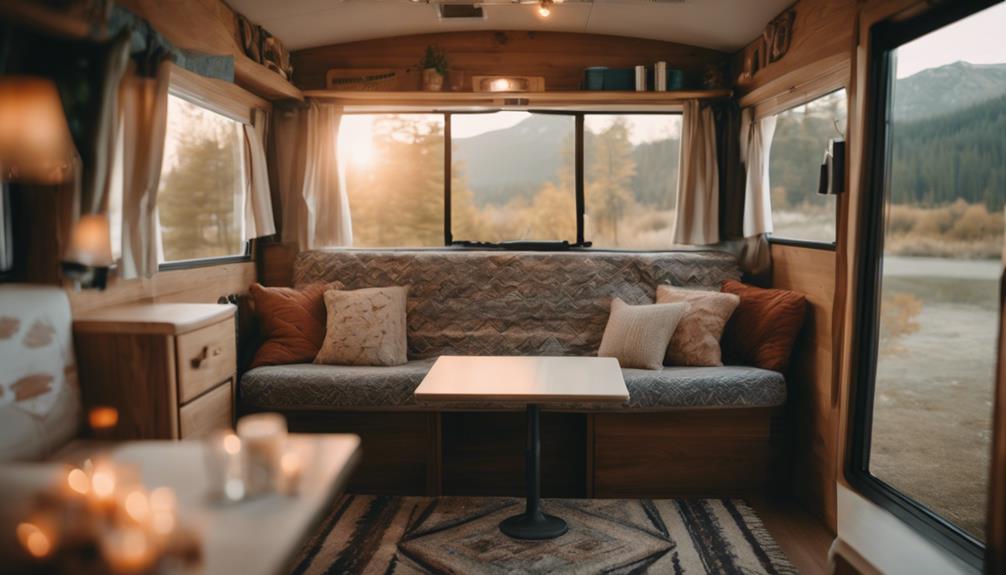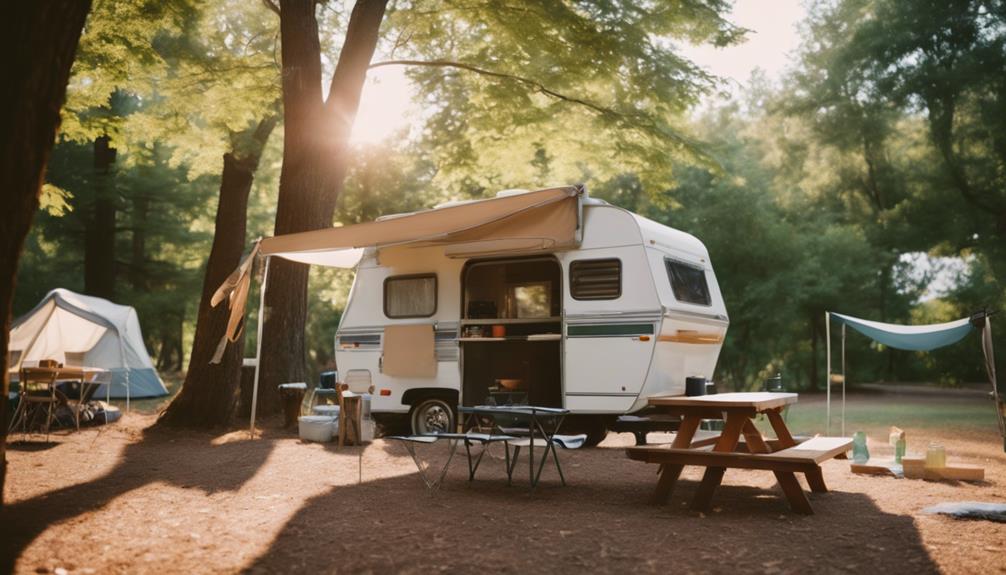To register a pop-up camper without a title, you need to check your state's specific regulations at your local DMV. Start by gathering important documents like a bill of sale and any proof of insurance. It's often necessary to verify the VIN with law enforcement and may also require temporary tags for immediate use. Be aware that purchasing without a title carries risks, including ownership disputes and complications in securing financing or insurance. Understanding these aspects can help streamline the registration process. Explore further details to guarantee you don't miss essential steps in maneuvering this challenge.
Key Takeaways
- Check your local DMV for specific title requirements and registration processes in your state.
- Maintain a bill of sale as proof of ownership during the registration process.
- Consider obtaining a bonded title if a bill of sale or previous title is unavailable.
- Verify the VIN with local law enforcement to ensure there are no liens or stolen status.
Understanding Title Requirements
Understanding title requirements is vital because they vary considerably by state and can impact your ability to register a pop-up camper without a title. Each state's DMV has different regulations, and some may require a title on a camper for registration, while others don't.
For instance, states like Idaho, Indiana, and Michigan have specific title requirements for truck campers, which could complicate your registration process if you lack a title.
Before you even think about purchasing a pop-up camper, it's important to research your local DMV regulations. This will help you determine whether you can register the camper without a title. Ignoring these requirements could lead to unnecessary headaches down the line.
In some cases, local law enforcement can assist in verifying VIN numbers to confirm that the camper isn't stolen, which is an important step when dealing with untitled campers.
Risks of Purchasing Without Title
When you buy a pop-up camper without a title, you open yourself up to serious legal risks, especially if ownership disputes arise.
You might also face challenges with registration, making it tough to get license plates or insurance.
Plus, there's a chance you could incur financial losses if there are hidden liens or if the camper turns out to be stolen.
Legal Consequences of Ownership
Purchasing a pop-up camper without a title can lead to serious legal issues, including the risk of it being reported stolen, which might result in seizure and criminal charges against you. The lack of a title complicates proving ownership, making it difficult to register the camper and obtain necessary plates. This situation could expose you to fines or penalties for operating an unregistered vehicle.
Additionally, you might face ownership disputes if previous owners or lienholders come forward, creating potential legal entanglements. These disputes can delay your ability to secure a clean title and complicate your ownership status. Without a title, your options for financing or insurance are severely limited, as most lenders and insurers require proof of ownership.
If you need to obtain a bonded title or file for a lost title, be prepared for complex legal procedures that can be both time-consuming and costly. Ultimately, the legal consequences of owning a camper without a title can create significant headaches, making it vital to ascertain you have all the necessary documentation before making a purchase.
Difficulty in Registration
Registering a pop-up camper without a title can be a frustrating and complicated process, often leading to unexpected hurdles. Without the necessary documentation, most states won't allow you to register the camper, as they require proof of ownership, typically in the form of a clear title. This lack of documentation can result in delays and may even prevent you from obtaining registration plates altogether.
Additionally, if you discover that the camper has unresolved liens or is reported stolen, you could face serious legal consequences, including having your camper seized by authorities. Tracing previous ownership can also be a challenge, making the registration process even more complicated. You might end up paying registration fees without securing the ability to legally use the camper.
Moreover, not having a clear title complicates future sales or transfers of ownership. Potential buyers may shy away from purchasing a camper lacking proper documentation, which can lead to frustration and financial loss down the line.
Potential Financial Loss
Buying a pop-up camper without a title can expose you to significant financial risks, including ownership disputes and potential loss of your investment. Without a clear title, proving ownership becomes challenging, leaving you vulnerable to claims from previous owners. If the camper has unresolved liens, you could face financial loss when those debts come to light, possibly leading to losing both the vehicle and your money.
Moreover, registering a camper without a title complicates the process, often resulting in higher fees and penalties for late registration. You might also unknowingly purchase stolen property, which can bring legal troubles and further financial loss.
Additionally, when it comes time to resell, a lack of documentation can deter potential buyers. They're likely to be cautious about purchasing a vehicle without a clear title, restricting your market and potentially lowering its resale value.
In light of these risks, it's essential to reflect on the importance of getting a title before making a purchase. The financial implications of buying without one can far outweigh any initial savings, making it a gamble you might want to avoid.
Title Recovery Process Overview
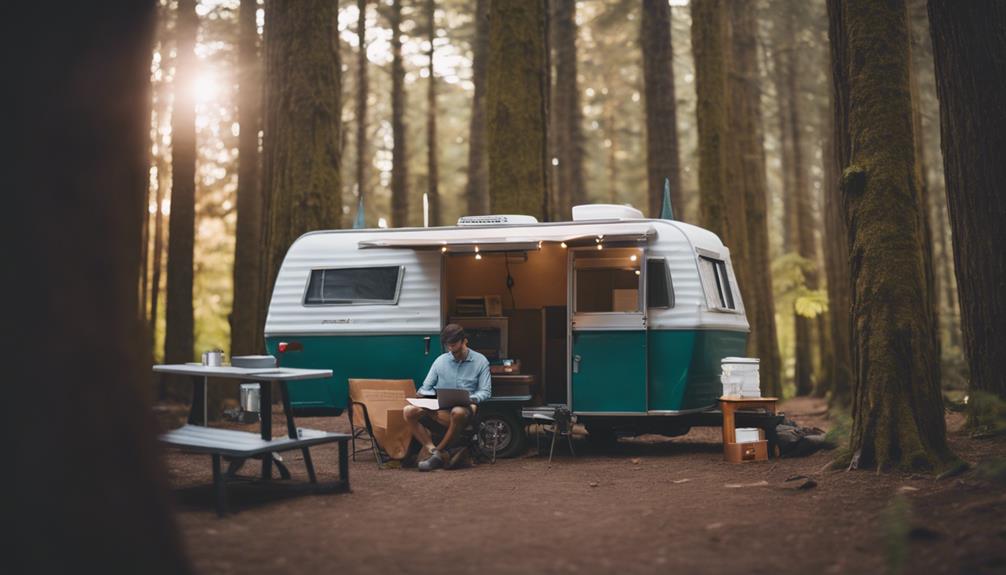
To recover a title for your pop-up camper, you'll need to follow a series of steps that often start with the last titled owner applying for a lost title. The seller must guarantee they obtain the title before selling the camper. Each state has unique procedures, so it's essential to research and consult your local DMV or tax office for guidance.
The title recovery process may require publishing a notice for previous owners, and you'll likely incur costs such as publication fees, inspection fees, and applicable sales tax. Local law enforcement may also need to verify the stamped VIN on your camper.
Here's a quick overview of the steps involved:
| Step | Action Required | Notes |
|---|---|---|
| 1. Last Owner Applies | Apply for a lost title | Guarantee all paperwork is accurate |
| 2. Publish Notice | Notify previous owners | Check state-specific requirements |
| 3. VIN Verification | Confirm VIN with law enforcement | Necessary for title recovery |
If you can't find a bill of sale, consider a bonded title, which requires a bond purchase and DMV paperwork verification.
Temporary Registration Solutions
Obtaining temporary registration for your pop-up camper can provide a practical solution while you work on securing a title. Typically, you can get temporary tags for around $35, allowing you to use your camper short-term. Check with your local DMVs, as they often have specific provisions for issuing temporary registrations. You may need to present a bill of sale and proof of insurance to complete the process.
In some states, you might be able to use your camper on private property without immediate registration, giving you a temporary solution until title issues are resolved. However, it's essential to familiarize yourself with local regulations regarding temporary usage, as requirements can vary considerably by state and jurisdiction.
Keep in mind that using your pop-up camper without a title for an extended period can lead to complications for future sales and may incur penalties for failing to register promptly. As a result, while temporary registration is a helpful stopgap, make sure to prioritize securing your title to avoid any long-term issues.
Community Insights and Experiences
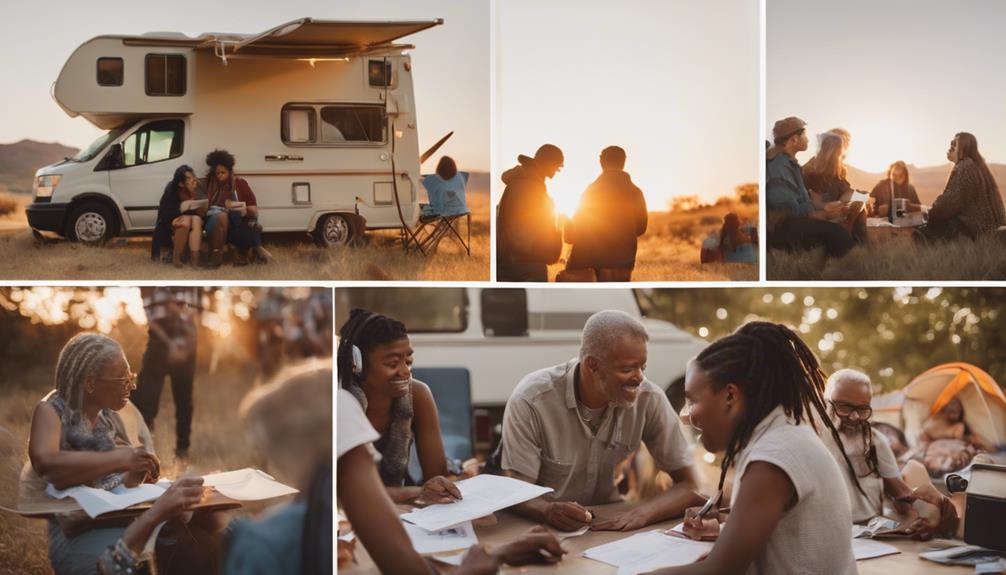
Steering through the complexities of registering a pop-up camper without a title often leads to valuable insights shared by those who've faced similar challenges.
Many individuals emphasize the importance of verifying the VIN number before making any decisions. Checking for previous titles or liens can save you from potential headaches down the road.
Numerous community members caution against purchasing campers without titles, outlining the legal and financial risks involved. Their experiences highlight that it's essential to engage with trustworthy sellers and seek legal advice when necessary. Over 67,000 people have shown interest in these discussions, indicating a broad concern about title issues among potential buyers.
To strengthen your case for registration, users frequently advocate for obtaining a bill of sale. This document serves as proof of ownership, helping to navigate the registration process more smoothly.
Engaging in these community discussions can provide you with vital strategies and support, ensuring you're better prepared for the challenges that lie ahead. Remember, being informed and cautious can make a significant difference in your camper ownership experience.
DMV Procedures for Registration
Registering a pop-up camper without a title requires you to gather specific documents and consult your local DMV for their unique procedures. Each state has its own rules, so it's vital to check what your DMV requires.
Here are three key items you'll likely need for registration:
- Bill of Sale: This document proves you purchased the camper and outlines its details.
- Proof of Insurance: You may need to provide verification that the camper is insured.
- VIN Verification: A thorough inspection may be required to confirm the camper's Vehicle Identification Number (VIN).
In some cases, you might apply for a bonded title if you can't provide a title. This involves purchasing a bond and submitting it alongside the verification of the VIN.
Remember, fees for registration can vary, so be prepared for potential costs related to inspections and title applications.
It's important to maintain thorough records of all transactions and communications with the seller, as these documents may be necessary during the DMV procedures for registration.
Always check with your local DMV for the most accurate and updated information.
Financing Options for Campers

When you're looking to finance a camper without a title, it's important to explore alternative solutions.
Many lenders have specific requirements, but some might accept other documentation like bills of sale.
Researching your options and comparing loan terms will help you find the best fit for your situation.
Alternative Financing Solutions
Finding financing for a pop-up camper without a title can be tricky, but several alternative options exist that might help you secure the funds you need. While most banks require a clear title, you can explore these alternative financing solutions:
- Local Credit Unions: Some credit unions may have more flexible requirements and could consider financing a camper with no title, especially if you establish a good relationship with them.
- Peer-to-Peer Lending: Platforms that connect borrowers directly with lenders can offer options that don't strictly require a title. However, be prepared for potentially higher interest rates.
- Seller Financing: If you're buying from an individual, they might agree to finance the purchase themselves. This could involve a simple written agreement and a bill of sale.
It's essential to research and compare different lenders, as terms and conditions can vary widely.
Make sure to weigh factors like interest rates, repayment duration, and any penalties for late payments. Understanding these aspects will help you make an informed decision about financing your camper without a title.
Lender Requirements Overview
Understanding lender requirements is essential if you're considering financing a pop-up camper, as each lender may have different criteria regarding titles and documentation.
Most banks and traditional lenders require a clear title for RV financing, since it serves as proof of ownership and collateral for your loan. However, some alternative lenders might accept other forms of documentation, like a bill of sale or a signed agreement, especially if you're dealing with a camper without a title.
When exploring financing options, it's important to research both local and online lenders. Some specialize in RV loans and may offer more flexible terms for untitled vehicles.
Keep in mind that financing without a title can lead to higher interest rates or less favorable loan conditions, so understanding these implications is significant.
Be sure to compare different loan options, focusing on fees, interest rates, and terms. This way, you can find the best fit for financing your camper.
Investigating Existing Liens
Investigating existing liens on a pop-up camper is vital to guarantee you don't inherit hidden debt or legal complications. Before finalizing your purchase, verify you check for any outstanding liens that could affect your ownership rights. Here's how to do it effectively:
- Check with the local DMV: Start by contacting your local Department of Motor Vehicles to verify the camper's status. They can provide information on any existing liens.
- Use online lien search tools: Several online services allow you to search for liens using the camper's Vehicle Identification Number (VIN). This can often be a quick way to gather information.
- Request seller documentation: If you discover a lien, ask the seller for proof that it has been satisfied. This documentation is vital before completing your transaction.
Documentation and Record Keeping

Keeping thorough documentation and organized records is essential for successfully registering a pop-up camper without a title.
Start by maintaining a bill of sale, as it's vital proof of ownership. This document captures the transaction details between you and the seller, reinforcing your claim to the camper.
Don't forget to keep copies of any correspondence with the seller, such as emails or messages. These can help establish the ownership history and intentions behind the sale.
Documenting any inspections or appraisals performed on the camper is also wise, as these records support claims regarding the camper's value and condition during registration.
Additionally, maintain your insurance documents related to the camper, as the DMV may require them for the registration process.
Finally, record any repairs or modifications you make to the camper after purchase. This information can be beneficial in future registration inquiries or for potential resale.
Legal Considerations and Resources
When you're registering a pop-up camper without a title, understanding the specific requirements is essential.
You'll need to gather legal documentation that proves your ownership and complies with state regulations.
Familiarizing yourself with these legal considerations can save you time and prevent complications down the road.
Understanding Title Requirements
Understanding title requirements for pop-up campers is vital, as they often differ considerably from state to state. Before purchasing, make certain to verify your local regulations. In some states, you might need a title to register your camper, while others may allow registration without one.
Here are three key points to reflect on:
- Legal Risks: Buying a camper without a title can lead to potential claims of stolen property, complicating your ownership proof during registration.
- Insurance Complications: Insurers typically require proof of ownership to issue policies, so lacking a title might hinder your ability to get insurance.
- State Procedures: Different states have specific procedures for obtaining a title for unregistered vehicles, such as applying for a bonded or salvage title.
It's imperative to consult your local DMV office for guidance on the necessary documentation and processes. In some cases, a bill of sale might serve as proof of ownership, but understanding your state's title requirements will help you avoid future complications.
Always make certain you're aware of the legal considerations to protect your investment.
Legal Documentation Needed
To register a pop-up camper without a title, you'll need specific legal documentation, including a bill of sale and proof of ownership from the seller. The bill of sale should detail the purchase date, price, and camper description. It's crucial to have this document ready, as it serves as your primary proof of transaction.
If you've lost the title, you might need to apply for a duplicate title through your state's DMV. This process typically requires a valid photo ID and may incur a small fee, usually between $2 and $5.45. Additionally, some states allow you to apply for a bonded title as an alternative. This involves obtaining a surety bond, which can cost anywhere from $100 to $150, based on your camper's value and condition.
Most states also require a VIN verification. This involves a local law enforcement officer inspecting your camper and completing a VIN verification form.
Always consult your local DMV for specific regulations and procedures, as requirements for registering a camper without a title can vary considerably by state.
Frequently Asked Questions
Can You Register a Trailer in Texas With Just a Bill of Sale?
Yes, you can register a trailer in Texas with just a bill of sale if you bought it from a private seller. Make sure to have your ID and any required documentation ready for the DMV.
Does a Pop up Camper Need a Title in Ohio?
Like a feather floating on a breeze, a pop-up camper in Ohio doesn't need a title if it weighs under 4,000 pounds. However, you'll still need to register it and display valid license plates.
How to Get a Lost Title for a Camper in Texas?
To get a lost title for your camper in Texas, submit an application online or in person. Include a certified title application, a photo ID, and a VIN verification. Expect a 30-day wait for processing.
Do You Need a Title for a Pop up Camper in Michigan?
In Michigan, you typically need a title for a pop-up camper to register it. However, if the camper's older than 15 years, you might not need one. Always check with your local DMV for specifics.
Can I Register and Use a Pop-Up Camper Without a Title?
Yes, it is possible to register and use a pop-up camper without a title, but it can be a complicated process. Before proceeding with the legal steps for popup camper title, it’s essential to research the specific requirements in your state. Some states may allow registration without a title with proper documentation, while others may require additional steps.
Conclusion
In steering through the process of registering a pop-up camper without a title, think of it as maneuvering through a winding road—there may be bumps, but with the right preparation and knowledge, you can reach your destination.
Stay informed about title requirements, explore temporary registration options, and keep meticulous records.
By understanding the risks and legal considerations, you'll guarantee your camper adventure starts on solid ground.
So, gear up and hit the road with confidence!

